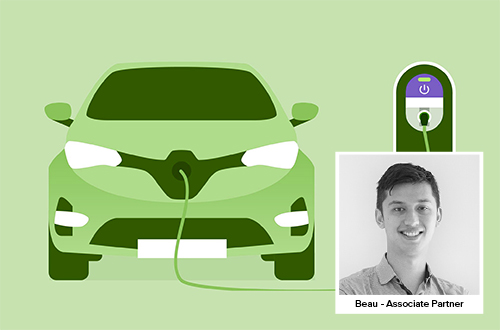Electric Vehicles have FBT exemptions – we’re excited to share this good news!

This is one tax law change to get people excited! In December 2022 the Government passed new legislation which outlines an exemption from Fringe Benefits Tax (FBT) for benefits relating to the use of electric vehicles. In this article, our Associate Partner Beau Appleby provides clarity on exactly what exemptions are available.
So, what electric vehicles are exempt?
The vehicle must be a ‘zero or low emission vehicle’. This means battery electric, hydrogen fuel cell &/or plug-in hybrid cars. Motorcycles & scooters do not qualify even if they are electric.
The vehicle also must:
- Be first held (owned or leased) & used on or after 1st of July 2022. This means vehicles held & used before this date are not entitled to the FBT exemption.
- The cost of the vehicle (first retail price) must be below the luxury vehicle tax threshold for fuel efficient vehicles. This threshold amount for 2022/23 is $84,916.
- For plug-in hybrid vehicles the exemption only lasts until 31st of March 2025. After this date you won’t be able to purchase a hybrid vehicle & receive the FBT exemption. However, if you have already qualified for this exemption prior then the rules will be grandfathered & you will be able to maintain the FBT exemption status.
- Benefits provided under a salary packaging arrangement are also included in the exemption.
What are the tax savings?
Normally when a company purchases a vehicle & allows a current employee (or business owner /director or even family members) to use it for private purposes this flags an FBT liability & a taxable payment will be incurred.
However, with this new FBT exemption, the company wouldn’t need to pay anything if the vehicle meets the exemptions outlined above.
For example, a business owner was to purchase an electric vehicle & it is held & used before 30 June 2023. Its cost was $55,000 including GST. This vehicle is used by the business owner & their family primarily for private purposes.
The company could claim back the $5,000 GST in their BAS & the remaining $50,000 could be written off as deprecation for tax purposes, saving the company $12,500 in company income tax (assuming a 25% company tax rate for businesses under $50 million turnover).
For the purpose of this example, we will also assume the FBT calculation was based off the Statutory Formula (used when no logbook is provided, or work/business use is very low) meaning the FBT liability would go from approximately $10,754 to nil! Yes, you read that correctly! Nil!
Further sweetening the outcome, for eligible electric vehicles, the FBT exemption also includes associated vehicle expenses such as:
- Registration.
- Insurance.
- Repairs or maintenance.
- Fuel (including electricity to charge & run electric cars).
Naturally, there are more pieces to the puzzle with this new FBT exemption, which often depend on individual circumstances, so if you have any queries around these recent changes, please contact your trusted Highview Accountant to discuss.
If you’re entitled to the deduction, we’ll be sure to make the most of the tax savings for you!
Beau Appleby
Associate Partner
Highview Accounting & Financial, Prahran